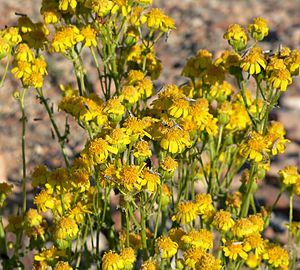Lobeleaf groundsel facts for kids
Quick facts for kids Lobeleaf groundsel |
|
|---|---|
 |
|
| Scientific classification | |
| Synonyms | |
|
Senecio multilobatus Torr. & A.Gray ex A.Gray |
Packera multilobata is a type of flowering plant often called the lobeleaf groundsel. It belongs to the aster family, which includes many well-known flowers like sunflowers and daisies. This plant grows naturally in the western parts of the United States, from California all the way to Wyoming and New Mexico. You can find it in many different places, from dry areas to more moist ones.
About the Lobeleaf Groundsel
This plant can be either an annual (meaning it lives for only one growing season) or a perennial (meaning it lives for more than two years). It's a herb, which means it has soft stems instead of woody ones like trees.
What it Looks Like
The lobeleaf groundsel usually grows a single stem, but sometimes it can have a few stems grouped together. These stems can reach about half a meter (about 20 inches) tall. The plant grows from a main root called a taproot and a branching base.
Its leaves are special because they are deeply divided into several parts, or "lobes." These lobes are often so deep that the leaves look like many separate small leaves.
Flowers and Blooms
The plant produces many flower heads that are arranged in a wide cluster. Each flower head is surrounded by green or yellowish leaf-like structures called phyllaries. Inside, you'll find many small, yellow disc florets.
Most of these flower heads also have a fringe of bright yellow ray florets, which look like petals. Sometimes, though, these ray florets might not be present.
Traditional Uses
Historically, parts of the lobeleaf groundsel plant were used for wellness purposes by some Native American groups. For example, the Navajo and Yavapai peoples used this plant in their traditional practices.

